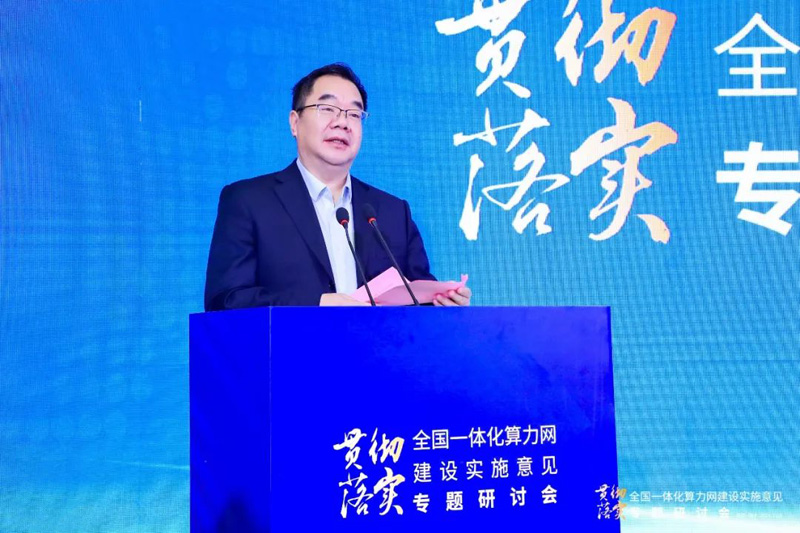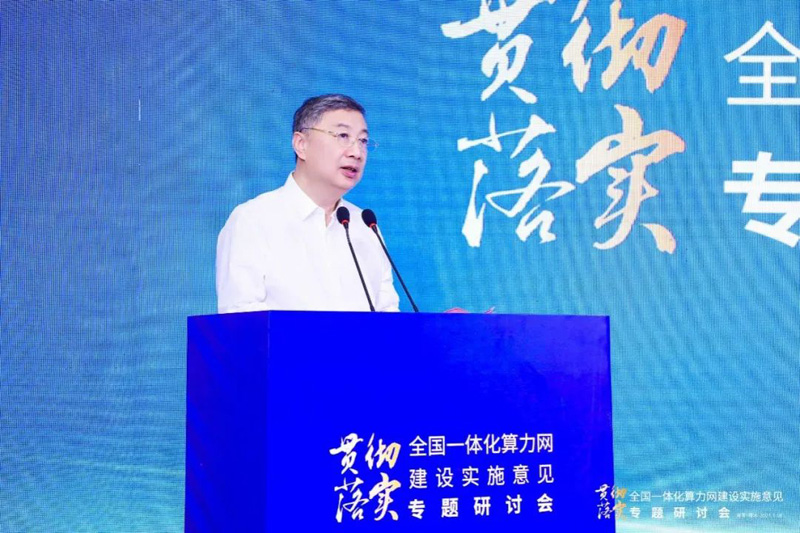
The symposium on the Implementation Plan on the Construction of a National Computing Power Network was held in Lingshui, Hainan Province on January 18th, 2024. It was presided by Zhou Min, Vice President of SIC and Xu Qiang, President of SIC attended and delivered the speech. Hosted by Big Data Development Department of SIC and co-organized by Nanhai Big Data Application Research Institute of Hainan Province, Big Data Research Institute of the Guangdong-Hong Kong-Macao Greater Bay Area, Western Research Institute for Advanced Big Data Application of Chongqing and Digital Governance Committee of China Information Association, the symposium aimed to discuss the innovation and development of the national computing power network to promote its construction and application.

Xu Qiang, President of SIC addressed the symposium

Zhou Min, Vice President of SIC presided over the symposium
In his speech, Xu Qiang indicated that accelerating the construction of the national computing power network is a strategic move that will gain new competitive advantages in the era of digital economy. This move will also contribute to the high-quality development of digital economy and speed up independent innovation in sci-tech for the build-up of international competitiveness of the country’s computing power. As the main force of China’s informatization, SIC has steadily promoted the national computing power network for a long time, and guided the continuous improvement of the overall planning of channeling more computing resources from the eastern areas to the less developed western regions and the general idea of the national computing power network with its groundbreaking research outputs. It has fully supported the drafting of relevant policies, and promoted the implementation of pilot projects.
Xu called for joint efforts to the building the national computing power network for mutual creation and benefit. He expressed the hope of making a concerted effort by local governments, research institutes and dominant enterprises to accelerate fundamental research and pilot projects, and to build a group of technological research and development experimental areas and industrial zones for computing power economy.

Yu Shiyang, Director-General of Big Data Development Department, SIC gave a keynote speech on topic of “A national computing power network: the digital infrastructure of Chinese-style modernization”.
Yu Shiyang, Director-General of Big Data Development Department, SIC gave a keynote speech on topic of “A national computing power network: the digital infrastructure of Chinese-style modernization”. Focusing on 8 key points of the policies in “the implementation plan on further carrying out the ‘Eastern Data and Western Computing’ project and speeding up the construction of a national computing power network”, Yu gave an in-depth explanation from the perspectives of background, trend, goal and countermeasures, and made an outlook on key directions for further promoting the implementation of the policy.
During the symposium, an opening ceremony for the training sessions on the national computing power network was also held. The training was co-hosted by Big Data Development Department of SIC and the Training Center (Publicity Center) of National Development and Reform Commission (NDRC). SIC released the Indicator System for the National Computing Power Network. With 6 primary indicators, 22 secondary indicators and 114 third level indicators, it will be the world’s first monitoring system on computing power, and a milestone for establishing a regular monitoring mechanism and learning the real situation of national computing power.
Guan Xiaohong, an academician of the Chinese Academy of Science attended the symposium and gave a keynote speech. Representatives from the Training Center (Publicity Center) of NDRC, Development and Reform Commission of Hainan Province, Data Bureau of Hainan Province, China Development Bank, persons in charge of key hubs in Beijing-Tianjin-Hebei region, Yangtze River Delta, Guangdong-Hong Kong-Macao Greater Bay Area, Chengdu-Chongqing economic zone, Guizhou Province, Inner Mongolia Autonomous Region, Gansu Province and Ningxia Hui Autonomous Region and representatives from other key regions attended the symposium and participated in the discussion.

